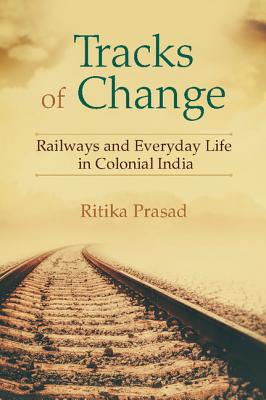

 Cambridge University Press
Cambridge University Press
Tracks of Change: Railways and Everyday Life in Colonial India


Key Metrics
- Ritika Prasad
- Cambridge University Press
- Hardcover
- 9781107084216
- 11 X 5 X 2 inches
- 1.45 pounds
- History > Asia - India & South Asia
- English
 Secure Transaction
Secure TransactionBook Description
Author Bio
My current book project Imprimatur, Mediator, and Adversary: Press, Public and State in India, 1780-2016 examines the long-term triangular relationship between newspaper press, the colonial and postcolonial state, and a broader public as it has developed in India over two centuries.
Instead of structuring state–press relations through the dichotomies of power versus freedom and/or surveillance versus sedition, it imagines it as one in which newspapers served simultaneously as imprimaturs, mediators, and adversaries in relation to the state. Coercive the colonial state undoubtedly was; however, precisely because of its unrepresentative, top-heavy and remote nature, it also relied extensively – if not exclusively – on newspapers for some of its most urgent public needs: whether of representing itself as a legitimate sovereign power in India, of securing favourable reception for its endless stream of interventions, or of accessing enough local information to determine what administrative imperatives would drive its policy decisions.
Attuned to such vulnerabilities and needs, journalists patently recognized their necessity to a colonial apparatus and the negotiating power that it engendered; however, they remained cognizant of the wide range of executive powers that the state still held over them. It was in this nebulous, uneven, and rapidly shifting landscape that the practical, everyday, relationship between state and press was negotiated, through a series of transactions that recognized the institutional power and constraints of both. As this book explores, many of the structures of modern governmentality and of its relationship with the modern press in India were produced within this thrust and parry, in which power could be monopolized by neither side, and in which the very mechanisms of regulation, control, and surveillance available to the state were deployed by journalists to recalibrate the relationship, whether in terms of the minutiae of their profession – from postage to subsidies – or in terms of their ideological claims to public authority.
Research Interests
- South Asian history; colonial and imperial history, nationalism and decolonization;
- Subaltern history; postcolonial theory; Alltagsgeschichte
- Social history, history of technology; technology and society
- Railway history
- Print culture
Education
- Ph.D., History (South Asia): University of California, Los Angeles, 2009
M.A., Modern History: Magdalen College, University of Oxford, 2001
B.A., History: St. Stephen’s College, University of Delhi, 1997
Source: University of North Carolina Charlotte
Videos
No Videos
Community reviews
Write a ReviewNo Community reviews